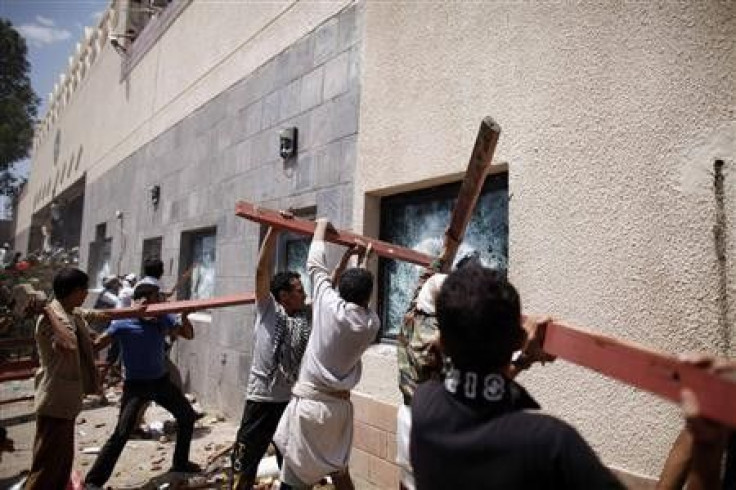Mideast Unrest Over Anti-Islam Film Spreads, But Leaders And Some Civilians Sympathize With US

Thursday morning witnessed the storming of the U.S. Embassy in Yemen by several hundred protesters, reportedly still angry about the same YouTube video that sparked similar anti-American protests in Egypt and Libya earlier this week. And, mirroring the last two incidents, the country's leaders apologized, almost immediately.
As in Egypt, the Yemeni protesters broke into the compound, tore down and burned the American flag and replaced it with a black flag reading "There Is No God But Allah," the AP reported.
Yemeni security forces drove the protesters off less than an hour after the demonstrations started. No embassy workers were reported hurt in this latest round of attacks, but the BBC said 16 Yemenis were injured and two police vehicles were burned out.
The Yemeni Embassy in the U.S. condemned the violence, just as the Libyan ambassador to the U.S., Ali Suleiman Aujali, also apologized on Thursday for the attacks on the U.S. Embassy in Benghazi, as well as the subsequent death of Ambassador Chris Stevens.
"I feel shamed at what happened," Aujali told CNN. "The people of Libya, they do appreciate very much the American support from the beginning. And without your help, without your support ... I would not be here today," he said, referring to deceased former Libyan dictator Moammar Gadhafi's 40-year grip on power.
On Thursday after the attack on the U.S. Embassy in Libya, Libyans in Tripoli and Benghazi staged a peaceful counter-protest, holding signs that read, in charmingly broken and incorrect English, "Sorry People of American this not the Pehavior [sic] of our Islam and Profit," and "Thugs And Killers Don't Represent Benghazi Nor Islam."
A Facebook page called "The Sorry Project" has also sprung up.
Egyptian President Mohammed Morsi said in a similar vein, "We will not permit any such event, any such occurrence against the embassies present in our territories. The Egyptian people reject any such unlawful act," the Wall Street Journal wrote, adding that inflammatory Internet clips "cannot be taken as a justification to assault consulates or ... killing innocent people."
The video clip in question, a movie called "The Innocence of Muslims," is a scurrilous portrayal of the life of the Prophet Mohammed. Several actors and producers who were involved with the film have come forward to protest that they didn't know what the film's content would comprise.
In a statement to CNN, several cast and crew members said they felt they had been "grossly misled about [the film's] intent and purpose," and were "taken advantage of by the producer," a man who went by the alias Sam Bacile.
Bacile, who was originally identified as an Israeli, is now thought to be a Coptic Christian, who went by many other aliases and is wanted for identity theft, Wired.com reported.
The BBC also reported several smaller, less destructive anti-American, and anti-"Innocence of Muslims" protests have erupted in Iran, Bangladesh, Iraq, Morocco, Sudan and Tunisia. Authorities in Afghanistan have attempted to shut down access to YouTube, NPR reported, and Afghan President Hamid Karzai postponed a visit to Norway for fear that violence could break out at home.
Security has also been upgraded at U.S. embassies and consulates around the world.
© Copyright IBTimes 2024. All rights reserved.












